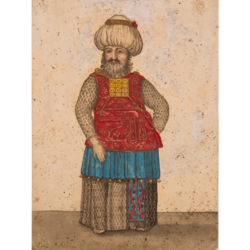| Source (Hebrew) | Translation (English) | Translation (Arabic) |
|---|---|---|
מַשְׂכִּיל לְדָוִד, בִּהְיוֹתוֹ בַמְּעָרָה תְפִלָּה׃ |
A prayer by David at a time of enlightenment, written when he was hiding in the cave. |
قصة لداوود عليه السلام عندما كان مختبئاً في المغارة. صلاة: من خلال صلاتي إلى الرب، |
קוֹלִי אֶל יְהוָה אֶזְעָק, קוֹלִי אֶל יְהוָה אֶתְחַנָּן׃ אֶשְׁפֹּךְ לְפָנָיו שִׂיחִי, צָרָתִי לְפָנָיו אַגִּיד׃ |
My voice calls out to YHVH, my voice begs my YHVH to listen. I pour out my words before Hashem to tell of all my troubles. |
أصرخ بصوتي إلى الرب بشكواي، راجياً أن يسمعني، وأحدثه بضيقي. أنت أعلم بمسلكي – في كل طريقٍ أسلكها، ينصبوا لي فخاً -. |
בְּהִתְעַטֵּף עָלַי רוּחִי וְאַתָּה יָדַֽעְתָּ נְתִיבָתִי, בְּאֹֽרַח זוּ אֲהַלֵּךְ טָמְנוּ פַח לִי׃ הַבֵּיט יָמִין וּרְאֵה וְאֵין לִי מַכִּיר, אָבַד מָנוֹס מִמֶּֽנִּי אֵין דּוֹרֵשׁ לְנַפְשִׁי׃ זָעַקְתִּי אֵלֶֽיךָ יְהוָה אָמַֽרְתִּי אַתָּה מַחְסִי, חֶלְקִי בְּאֶֽרֶץ הַחַיִּֽים׃ הַקְשִֽׁיבָה אֶל רִנָּתִי כִּי דַלּֽוֹתִי מְאֹד, הַצִּילֵֽנִי מֵרֹדְפַי כִּי אָמְצוּ מִמֶּֽנִּי׃ הוֹצִֽיאָה מִמַּסְגֵּר נַפְשִׁי לְהוֹדוֹת אֶת שְׁמֶֽךָ, בִּי יַכְתִּֽרוּ צַדִּיקִים כִּי תִגְמֹל עָלָי׃ |
When my soul wraps itself around me protectively, you know my path – on every road I take they lay traps for me. Look to the right and see – I don’t recognize anyone; I have lost all avenues of escape, no one is looking for me. I call out to you, YHVH, I say you are my protector, my portion is still in the land of the living. Listen to my prayer for my calamity is boundless; rescue me from my pursuers who are so much mightier than me. Take my soul out of bondage so that it can thank your name; the righteous will crown themselves with me when you act with benevolence towards me. |
عندما تلتف روحي في داخلي حولي من أجل الحماية، ألتفتُ إلى يميني فلا أجدُ من يهتم لأمري أو يحميني. فقدتُ كل طرقِ الهرب. لم يبق لي ملاذٌ أو من يسألُ عني سواك. أدعوك يا ربي قائلاً أنت ملجأي. ما زال لي نصيبٌ في أرض الأحياء، فأرجوك أن تُصغِ إلى دعائي لأنني قد تذللتُ كثيراً. أنقذني من مضطهديني فهم أشدُ بأساً مني. فرّج عني محنتي لِتُسَّبِحَ روحي بإسمك فيلتفُ الصدّيقون من حولي ثواباً لي منك. |

“תהלים קמ״ב | Psalms 142, a maskil with translations in English and Arabic” is shared through the Open Siddur Project with a Creative Commons Public Domain Dedication 1.0 Universal license.










In the event of the abduction of three Jewish Israeli teenagers in 2014, ( גיל־עד מיכאל בן בת גלים (שעאר) | Gilad Michael ben Bat Galim, יעקב נפתלי בן רחל דבורה (פרנקל) | Yaakov Naftali ben Rachel Devorah, and אייל בן איריס תשורה (יפרח) | Eyal ben Iris Teshurah), two of which were students of Rabbi Adin Steinsaltz’s Mekor Haim Yeshiva High School in Jerusalem, Rav Steinsaltz wrote:
[…] “Misheberakh for those held in Captivity” (Open Siddur) […]